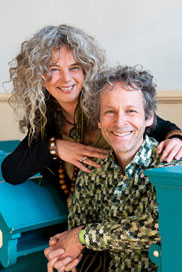High Sensitive or High Alert?
Sounds familiar? A friend drops by and tells you that he or she is highly sensitive: sensitive to loud noises; avoids crowded places; and it’s completely clear to them and it all makes sense, yet for some reason you have the feeling that something doesn’t add up. There’s something missing and that something is related to intuition, and if that’s the case, then your friend may be highly alert.
(Lees in het Nederlands)
High sensitivity is normal
We believe that being highly sensitive is not really extraordinary. In fact, we all have the potential to be highly sensitive but in situations where there really is no immediate need, this ‘skill’ can take backstage.
Thousands of years ago, it was not only practical, but also essential for primitive man in the wild to have very sharp sensory perception: to be able to smell the scent of a dangerous animal in the distance, or to recognise a certain sound instantly as safe or threatening. It was important to be on the alert for imminent danger, but that’s not all. We could also sense which foods were better avoided and when to take heed of threatening weather conditions.
Sharpened senses
In society today, most of the dangers mentioned cease to exist. We no longer need to be on constant alert and have become accustomed to living in a safe environment. We rely to a much lesser extent on our senses to survive and they don’t need to be as focussed. Unfortunately, with the loss of this skill, our ability to sense things is also no longer a priority. Not many people today believe it to be normal that they are able to empathize with another person; to just intuitively know that they have a connection with someone; or that they will settle comfortably in a certain house or workplace. We now call people who have this skill ‘highly sensitive’, even though this could be considered to be quite normal.
There tend to be more and more people
who somehow (re) discover
their high sensitivity
Thanks to the increased attention given to the development of self-awareness, more people continue to (re) discover their high sensitivity. However, those we might call ‘highly sensitive’ are still always greatly outnumbered.
At the same time, we note that there are a vast (and ever increasing) number of people who are (extra) sensitive to stimuli. They tick the boxes that identify them with high sensitive characteristics, but in our view, it appears to be a different form. It is not the natural innate way of sensing your surroundings, but is an acquired means of alertness for impending disaster.
An unsafe environment
High alertness develops when you are raised in an environment that somehow feels physically or emotionally unsafe. It may be due to heightened tension in the home, parents who are unable to make a child feel wanted, or because of bullying at school. If you do not grow up in surroundings that make you feel completely protected and nurtured, you learn from an early age to be on the alert at all times. You notice unfamiliar sounds and you respond strongly to odours, unforeseen events, etcetera.
This explains why you may have been easily frightened by unexpected sounds from an early age, and if your mother was overly stressed throughout her pregnancy, or if you were incubated in your first few weeks, you may have the misfortune to have had high alertness since childbirth.
You are often able
to sense exactly
what mood prevails around you
Not only are you often overly sensitive to physical sensations, but also able to determine whether people around you are emotional or if the mood in a certain place just doesn’t feel right. Someone is often in a state of high alert when their childhood surroundings were unsafe or even when they felt slightly unsafe. This child will use all his or her senses to persevere or even to ‘survive’.
A high level of alertness will continue, even if you find yourself later in a safer environment where it is perhaps less needed or even unnecessary. It is likely that you will almost always retain a sharper level of awareness. Stimuli, loud noises, congestion, stress, crowds, etcetera, will probably affect you more than others.
Acting from the mind
But are you then also automatically ‘highly sensitive’ in the broadest sense of the word? We believe that this is not always the case. In fact, it is less often than we think. During coaching sessions we communicate with many people who are, as we call it, ‘highly alert’, but not necessarily ‘highly sensitive’. These are often people who act from the mind a great deal of the time: their thoughts and emotions rule and the voice in their heart is not, or rarely, ever heard. They believe they are able to sense situations, when in fact it is really their emotions that have taken control. (Read more on what distinguishes emotions from feelings in our Dutch article here.)
They say: ‘See, I knew this wouldn’t work out, I just knew it!’ Or: ‘I don’t think we should do this, it’s bound to turn out bad’, and then sure enough, it then happens, just as they predicted.
The fear that something will go wrong will often mislead someone who is highly alert, because it also went wrong in the past. You are able to create a situation with fear (and emotions in general) and what you are then faced with is exactly what you are afraid of. ‘If you always do what you always did, you will always get what you always got’. The focus of your attention only becomes stronger, and so it continues...
A characteristic of
listening to your heart is
that there are no emotions involved
People who are highly sensitive are accustomed to being in tune with their feelings and that certainly differs from being lead by your emotions. A characteristic of listening to your heart is that there are no emotions involved. You feel an inner peace, a certain serene contentment, because you know that you have made the right choice from the heart. Your intuition is your most important guide in life.
Intuition is high sensitivity, guided by pure knowledge, straight from the heart. You ‘feel’ things, sometimes long before they happen, and that is a valuable gift, both in your personal and professional life.
Natural sensitivity
If you are high sensitive, you are one of the few people whose physical and emotional senses still retain their primal natural sensitivity. You most probably avoid busy trams and other places where you experience too much stimuli, not because you are afraid, but because it makes you feel better. You guard your own space and prevent others from unnecessarily breaching your boundaries.
High alert people will perceive external stimuli as a threat. They often feel a victim of their environment but do not have the strength and courage to implement change.
Both are possible
When you read this you may think: ‘but I recognise both. I have that intuition and know what my heart says but I am just as often overcome by fear and negative thoughts, which cause me to feel a victim of the world around me’.
It may very well be so and is even very likely. Many people who are highly sensitive have indeed also developed a certain level of high alertness, but the major difference is that you are born highly sensitive, but learn to be highly alert during the course of your life.
There is a significant difference between putting yourself in someone’s shoes because you simply feel what they feel, and when you need to be quiet or leave the room because you feel tension when a family member or colleague is in a bad mood. The latter is in fact driven by your emotions and learned behaviour.
As a highly sensitive person you can only fully experience the strength of your high sensitiveness when you dismiss the high alertness, even if it is only temporary. It is then that you are clear-minded, free of judgment and additional emotions, and able to act intuitively from a pure heart.
Motives
In the human approach we have developed in our coaching, a clear distinction is made between the acquired characteristics that we call ‘motives’, and innate characteristics that are inherent to your personal mission in life. In short, your acquired characteristics (motives) are from the mind, while the innate (mission) characteristics are from the heart. Your motives in life require energy while mission characteristics on the other hand, provide you with energy. Your personal motives are created during the course of your life by influences from your environment and they help you to be who you think you should be, and who you think you should be in the eyes of others. High alertness, as we describe it here, stems in this human approach purely from your motives, from acquired behaviour.
Your motives are a result of an acquired learning process, which you can basically switch off. The same applies for high alertness. Depending on your history and how you have become high alert, it is probable that certain stimuli will yield certain emotions. It is possible to learn to manage this and if there is no high sensitivity involved with the high alertness, there is even a chance that it may disappear completely. It may be possible that things that shocked you in the past, or which you avoided, suddenly do not seem to affect you anymore.
If you truly want to be rid of high alertness, then you have to be prepared to go all the way to achieve awareness when it comes to these emotions. This involves recognition, acknowledgement, acceptance (in your mind), permission (from your heart) and ultimately, embracement. If you do not choose this path, or do not have the courage, then you will continue to retain a certain level of high alertness. A consolation however, is that at least then you will know from where it originates.
At peace
If you are not only highly alert, but also highly sensitive, then dismissing your high alertness will not ensure that you are targeted less in the future. You will always retain your sensitivity and perceptivity but you will be more at peace because you will have learned to detach your emotions from your feelings.
It is likely that your high alertness will leave an invisible scar, which may become sensitive at times when you are off balance or when emotions are at play. It may sometimes seem as if you are back where you started, and then it is important that you distinguish between high alertness and high sensitivity without delay. If you find that certain stimuli are bothering you, it’s time to take a break, tone down your emotions and focus on your inner self again. Only when you have re-established your balance, will your high sensitivity and accompanying intuition guide you again.
Is it possible to learn to be highly sensitive?
If you can ‘unlearn’ high alertness, why wouldn’t you be able to learn how to become highly sensitive? It is our view that high sensitivity is one of our natural innate characteristics. It cannot be learned, but it is in each of us from an early age. Even when it does not present itself, the characteristics are still latent, but if high sensitivity does not play an active role from an early age, then it becomes more difficult to ‘activate’ this natural characteristic. The (re) ‘dis-covery’ of natural characteristics can indeed only be achieved by ‘unlearning’ (or discarding) as many motives as possible, or in other words, your acquired characteristics; characteristics that inhibit your true nature, your light, and your mission. And this is only possible when you decide deep down that you truly want to be yourself and follow only the path of your heart.
In summary
- If you are highly alert, you are not automatically highly sensitive.
- If you are highly sensitive, you may also have (a certain level of) high alertness. In fact, this is very common.
- When action is taken in high sensitivity, you do not choose the role of victim, however, this does often happen when acting from your high alertness.
- High alertness is acquired and can essentially be discarded.
- When you choose to discard your high alertness as a highly sensitive person, or choose to switch it off, you will benefit optimally from your intuition and pure knowledge.
- If you are only highly alert and able to discard it, it will be possible for you to (fundamentally) eliminate your over-sensitivity for stimuli.

 Ontdek ons boek: Leven in balans en gewoon gelukkig zijn
Ontdek ons boek: Leven in balans en gewoon gelukkig zijn

